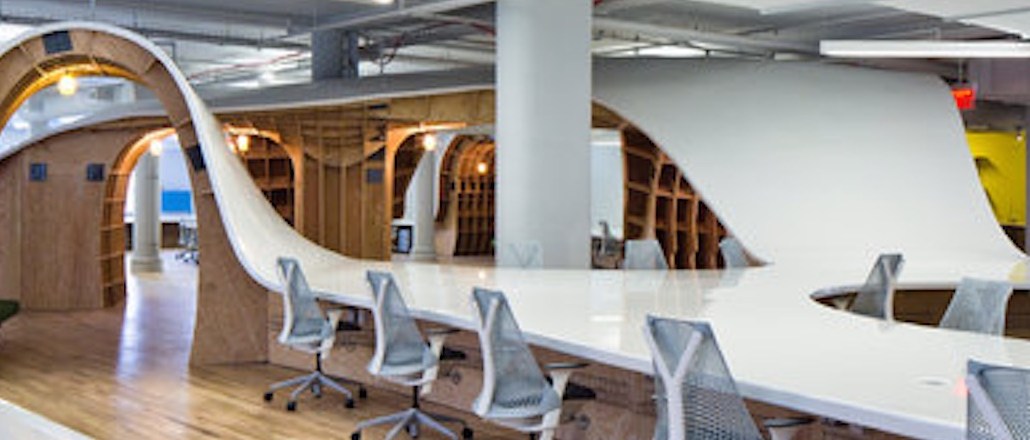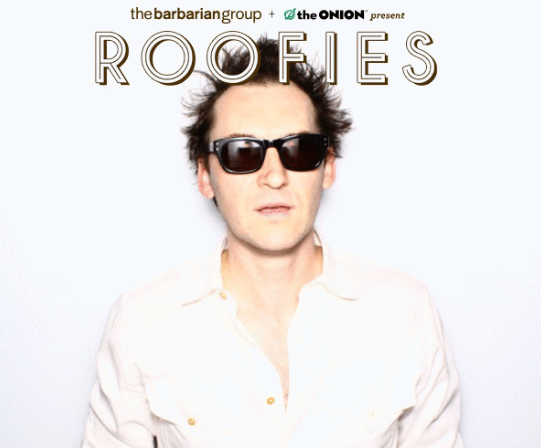Secure your place at the Digiday Publishing Summit in Vail, March 23-25
‘It is literally being run into the ground’: Inside The Barbarian Group’s meltdown

There are a lot of empty chairs at the Superdesk, the totem of The Barbarian Group, a once-hot digital shop that is now a shadow of its former self.
Over the last few months, the agency has lost almost all of its top executives. It now has its third chief executive officer in a year, Aaron Lau, who replaced Peter Kim, a former Cheil executive. Kim had taken over from Sophie Kelly, the shop’s longtime CEO, who was ousted in December. In March, Benjamin Palmer, then-TBG chairman, in whose apartment the agency was founded 14 years ago, left, and less than two months after that, Edu Pou, chief creative officer, also left. Of The Barbarian Group’s six founders, none remain. The agency is down to a single office and has lost about 40 percent of its employees from its peak.
There are so many former Barbarians that there’s a Facebook group with Barbarian alumni. It’s called “It was awesome,” a nod to “It’s gonna be awesome,” a phrase the agency trademarked on a whim in 2012.
In six interviews with former and current employees, a familiar picture emerges of a cool digital shop that faltered after its founders left, descending into management shuffles and a sale to a company with a culture at odds with its own.
“The fact that it’s still around at all is a testament to its heritage, since right now it is literally being run into the ground,” said Rick Webb, a Barbarian co-founder.
Barbarians at the gate
From its humble beginnings in 2001 inside Palmer’s apartment, The Barbarian Group turned into the very model of an “internet-first agency.” In fact, it was proudly not an agency. It did production work for ad agencies that didn’t have expertise in building interactive experiences. The Boston-based shop eschewed job titles in favor of thinking of all employees as “barbarians.” In his book, “Agency,” founder Webb said the shop thought of the internet as the client and audience.
Project work was important. “The Subservient Chicken,” created with CP+B and Burger King in 2004 was a project that didn’t make the shop a dime, but put it firmly on the map. A man in a chicken costume seemingly acted out any command from visitors. It was a defining moment in the still emerging field of interactive marketing. There was a project for CNN that let people buy t-shirts with CNN headlines, and another for Esquire that created an augmented reality issue.
But a large part of The Barbarian Group’s cool cachet came from great PR. There were parties — first at the agency’s home base in Boston, but then a series of “Roofies” — rooftop parties featuring cool musical acts that took place regularly in the summer. At SXSW, the annual Barbarian party was a fixture. There were other blowouts too: As one former strategist puts it, “We brought fucking [Julian] Assange to SXSW,” referring to the 2014 festival when the agency beamed the Wikileaks founder into a theater in Austin. On Fridays, Barbarians trade in jeans and sneakers for formal attire as part of “Formal Fridays.”

None of this was as much deliberate spin as just Palmer and co-founder Rick Webb — who met on the goth nightclub circuit in Boston in 1991 — wanting to create a place they’d like to work in. A former employee puts it this way: “They weren’t going to get hired anywhere else, so they had to do this.” According to staffers, the internal motto was to “fight the good fight,” with the internet as the client.
Too bad the internet doesn’t pay. The Barbarian Group was as much a victim of an era when margins, especially at digital shops, were being squeezed. The company began as a production house, and even then, things were lean. The reason TBG continued to succeed, according to sources, is because it could place a higher price on digital product because they were good at digital creative. The shop also made other moves, like starting a content creation-studio to take it beyond just building websites for clients. Clients included Pepsi, GE and Samsung (which owns a stake in Cheil, which now owns Barbarian).
The Cheil sale
While employees say it’s hard to figure out when things started changing, one major turning point and reason for the decline of Barbarian was the sale of the shop to Korean holding company Cheil. In 2009, the company bought a 47 percent stake, which then increased to 75.5 percent and by 2014, was 100 percent.
There are a few reasons for the purchase: On the outside, it was because Cheil wanted a foothold in the U.S. But Barbarian also had the culture. Samsung, which owns Cheil, was sending a lot of U.S. work to non-Cheil agencies, like Leo Burnett, and needed an American creative shop to do some of it.
“From a business perspective, we weren’t attractive,” said one former employee. “But it was really the culture that attracted the talent and made the place.” For Barbarian, it was the chance to get cash.
Once Cheil took charge, things started change. In 2011, Webb, one of the founders, left, creating what one employee calls a leadership crisis that weaved through the next five years. Another founder, Keith Butters, also left along with Palmer earlier this year. Losing founders is often a death knell for agencies tightly bound by culture.
“It’s hard when founders leave,” said an employee who started at the agency after Cheil bought it. The agency moved almost straightaway to new digs in TriBeCa. And there were some layoffs. “It was sort of undoing itself,” said the former employee.
Business was middling. Under Cheil, the agency landed Etihad Airways and Kind Snacks, but the former was the result of so many pitches that the margins weren’t high enough to sustain it, said a source with knowledge of the matter. Kind Snacks never went anywhere because the brand doesn’t do a lot of advertising. But the agency also had some category-defying work like the GE Show, an interactive online film series that started in 2010, and a Cannes stunt featuring brick phones in 2015. Headcount at one point across three offices was about 160. The Boston office shut down in 2012, with the San Francisco office following. The agency now says it has “approximately 100” employees.
A good example of Barbarian making stuff that was high on image but low on margins was Cinder, created in 2013 as an open-source C++ library for “aesthetic programming,” which went on to win Cannes awards and solidify the agency as firmly in the business of being really good at the internet. But it was hard to monetize Cinder as an open-source platform.
And then there was the desk. The Superdesk, installed in 2014, was an undulating, one-piece desk designed by Clive Wilkinson Architects and meant to seat the entire staff at one table. It was an embodiment of Barbarian culture, and an earned media coup, with every major trade and architecture magazine writing odes to the desk as the future of work. But it was derided internally. “The narrative was so bad. It was so counterintuitive. The agency with the desk,” said one staffer.

The downturn
The recession wasn’t kind, although the agency was somewhat profitable, however. Kelly doubled revenue to about $30 million in 2015, according to one source familiar with the matter. (Ad Age DataCenter places The Barbarian Group’s revenue at$22.8 million from $21.8 million in 2014, while Cheil’s U.S. revenue dipped from $78.4 million in 2014 to $77.6 million last year.)
Last December, Cheil fired CEO Kelly, ostensibly over margins, although employees say it was more about a culturally bad fit. Clients weren’t informed that the head of one of its agencies was leaving, and top clients like PepsiCo’s Brad Jakeman were vocal about their displeasure about how the departure was handled. Kelly’s departure was right after Michael Kim, a top Cheil executive whom employees say knew the United States and understood digital, also moved on. And following Kelly, more talent left, including creative director Jill Applebaum, CTO Robert Christ and head of talent Michele Prota.
“When they fired [Kelly], an account person, who personally owned the relationships with every major client, out of the blue without telling the clients in advance, the fate was sealed,” said Webb. “They’ve been play-acting since December, and they never had a chance.”
According to one search consultant, “Cheil hasn’t figured out what to do with anything in America.”
Cheil, for its part, is cognizant of missteps. Interim CEO Lau, who himself came into Cheil via the acquisition of his consultancy Bravo Asia, said that TBG’s culture of entrepreneurship and fun environment were very different from Cheil. Going forward, he said, he will make an effort to shape the future of the agency with what he calls “a healthy regard for culture.” Lau said his first order of business is to find a permanent CEO and talk to former employees to figure out what happened. “I’m not here to change history; I’m here to shape the future.”
Lau doesn’t want to talk about the past — he said that he can’t comment on what happened since he wasn’t present. But going forward, he said, he wants to evolve TBG into a shop “more in line with the needs of the marketing community. There will be a new and improved TBG.”
More in Marketing

‘The conversation has shifted’: The CFO moved upstream. Now agencies have to as well
One interesting side effect of marketing coming under greater scrutiny in the boardroom: CFOs are working more closely with agencies than ever before.

Why one brand reimbursed $10,000 to customers who paid its ‘Trump Tariff Surcharge’ last year
Sexual wellness company Dame is one of the first brands to proactively return money tied to President Donald Trump’s now-invalidated tariffs.

WTF is Meta’s Manus tool?
Meta added a new agentic AI tool to its Ads Manager in February. Buyers have been cautiously probing its potential use cases.





